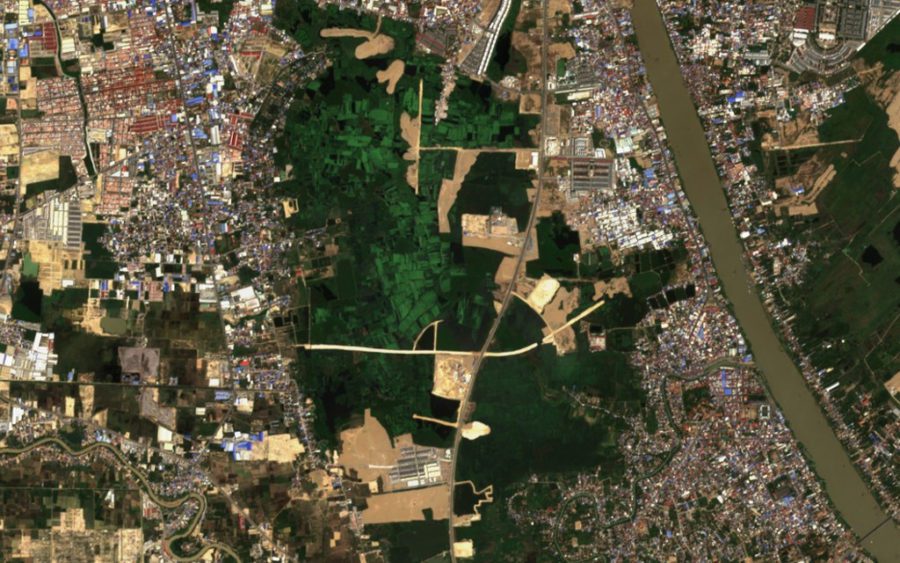A major Phnom Penh lake development involving several oknha and senators threatens livelihoods and wetlands, as well as rivers with sewage contamination, and puts 1 million people at risk of flooding, the U.N. said in a letter to the Cambodian government — which in turn responded with seven pages summarizing assessments of the development.
According to the government, the landfilling and development of Boeng Tompun, in the south of the city, will lead to $4 billion in national revenue over 20 years, the construction of $837 million of road and sewage infrastructure, and little impact to food security, biodiversity or health.
But in a letter dated December 23 and released on Thursday, several U.N. representatives say they had received information that 1,000 families’ homes and livelihoods were threatened.
A large area of the wetlands has been leased to ING Holdings, which is owned by former Senator Ing Bunhoaw, according to the U.N. and the companies registry. Prime Minister Hun Sen’s daughter Hun Mana’s Orkide Villa and oknha Pheap Heak’s Chip Mong Group also received rights to develop the lake, the U.N. says.
Star Auto; the International School of Phnom Penh; Urban Village; R&F Group; Borey Peng Huoth, led by four oknha; Lingnan Garden; Maritime Group; the Japanese-owned Aeon Mall; and Versaille Square are also named in the U.N. letter as firms re-leasing land from ING for developments on the wetlands.
“[P]lans for ING City’s development indicate that the majority of the wetlands will be destroyed,” the U.N. says.
It says 77.6 million cubic meters of sand will be required for the infilling, and more than 30 percent of the wetlands have already been destroyed, potentially increasing the risk of sewage-contaminated flooding for half the city.
The U.N. names the sand dredging companies providing sand to the ING project as Hero King and Global Green Energy Development. Senator Ly Yong Phat’s wife, Kim Heang, and daughter Ly Arporn are directors of Hero King, while timber oknha Try Pheap’s associates Try Dalux and Try Daphors, as well as Try Dalin, are directors of Global Green. Dalux has been reported as being Pheap’s son.
“[W]e wish to express our serious concerns about the alleged grave impacts of the project,” the letter says.
The Cambodian government issued two letters in response, dated February 17 and 18. It says the wetlands area is 2,572 hectares, not 1,500 hectares as stated by the U.N., and just 863 hectares has been approved for development.
Of the lake basin itself, 181 hectares will be preserved, while 190 hectares will be kept as state private land but developed by Chip Mong director Leang Khun and Borey Peng Huoth’s Thay Cheahuoth in exchange for building infrastructure and resettling existing occupants, a government response says.
“The impacts and benefits of the project were well assessed,” it says. “There is no forced eviction. … Health and employment status is improved. … The project does not affect food security and biodiversity.”
The government adds that people on the lake are illegally occupying and exploiting public property.
“Do the above-said 1,000 families carry legal land title deeds or illegally settle in the zone?” it asks the U.N.
The lake has about 100 species of fish, but they are not classified as vulnerable, threatened or endangered, the government says.
Fish, snails and vegetables being grown in the lake have been found to contain high levels of chromium, zinc, copper, lead and mercury and are “not safe for consumption,” it adds.
“[C]ultivators and fishermen encountered severe skin problems and faced with frequent cholera, dengue fever, typhoid fever and diarrhea,” the government says.
It further lists as achievement several roads and sewage systems constructed as part of the development, and says the loss of natural wastewater purification can be resolved by treatment stations and canals.
Those who live around the lake have previously said that their meager incomes are already dropping with fish disappearing from the increasingly filled-in lake.













